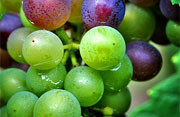The Svalbard Global Seed Vault opened in Norway this week, providing a permafrost home for the genetic diversity of the world's food plants. According to the Norwegian Ministry of Agriculture and Food, the vault can store 4.5 million different seed samples, duplicating seed collections from genebanks around the world.
Genetically modified organisms (GMO) are currently not allowed in the vault without special approval. Though the underground facility is fortified against global warming, French Chardonnay is not, and a non-GMO version could become a thing of the past if temperature trends continue.
The Intergovernmental Panel on Climate Change is in unequivocal agreement that human-induced global warming will melt glaciers, elevate sea level, and disrupt existing weather patterns in the long run. Meanwhile, fluctuations are helping some wine producers. And with genetic engineers tinkering away, seasoned oenophiles and dedicated box wine consumers alike may one day praise Florida white.
Wine grapes are particularly sensitive crops with narrow average temperature ranges for viable and good vintages. Traditional growing regions have become less able to sustain these ideal temperatures, triggering a great grape migration—the vines are creeping away from the equator, into regions once considered beyond the vintner's territory.
The Pacific Northwest has already seen a boom, and the Wall Street Journal reported in 2007 on a shift of production into Canada. As the winters in British Columbia become less severe, the lessened risk of frost gives farmers a chance to plant higher value European varietals. According to a study published in Proceedings of the National Academy of Sciences, climate simulations indicate that the United States could lose up to 81 percent of its premium production acreage by the end of the 21st century.
The effects of climate change can also be felt on the palate. "Maybe 20 percent of the wine from California is now dealcoholized—not all of it, not every year, but the dirty little secret is that global warming is pushing up the sugar levels, pushing up the alcohol levels," said Michael Veseth, author of The Wine Economist blog, in a 2007 interview with Foreign Policy.
Some producers in traditional wine regions hope biotechnology will allow them to circumvent the problems associated with rising temperature and erratic weather. Scientists recently sequenced the genome for pinot noir grapes, meaning a genetically modified breed might be in store.
Many winegrowers and consumers contend that the terroir and local environment matter highly in the final taste of a wine, so genetic manipulation could be used to keep vines rooted in their traditional locations. For those growers and consumers who believe that the grape itself dominates the final taste, genetic manipulation opens the door to wider migration. Genetic changes might also help grapes fight off diseases, which is of particular interest to places like Florida, where wine grapes suffer from bacterial, fungal, and viral afflictions.
Long before Gregor Mendel and his peapods, farmers were using processes of selection and crossbreeding to improve the quality of crops, but in modern times companies like Monsanto have taken breeding high tech. The first genetically engineered plant—tobacco—was field tested in Belgium in 1986. And ever since the U.S. Food and Drug Administration declared in 1992 that genetically engineered foods are "not inherently dangerous," exempting them from special regulation, GMOs have found their way into markets across the globe. Resistance and debate still rages over whether GM crops are dangerous to humans or regularly contaminate non-GM crops in the growth vicinity.
French consumers have reached a general conclusion: They do not want any more genetically modified foods in their glasses or on their plates. According to a survey by the French Ministry for Ecology, 72 percent of the French "consider it 'important' to be able to consume products without genetically modified organisms." France recently filed a request with the European Union to formally ban the commercial use of Monsanto corn (MON 810), the only GM crop grown in the country.
Yet some French farmers and seed companies fear the parliament will go too far in crafting a new law on GMOs. "Today there are 102 million hectares sown with GMO seeds around the world. What we fear is that if France rejects GMOs we will be left behind and be dependent on other countries technology," said Philippe Pinta, president of a French agriculture lobby, as quoted by Reuters.
In the next few years, international policies on climate change and GMOs will directly affect where this market is headed. For now, traditional growers are left fretting about Canadian wines that consistently win competitions.
![]() This article is licensed under a Creative Commons License.
This article is licensed under a Creative Commons License.
Please read our usage policy.




